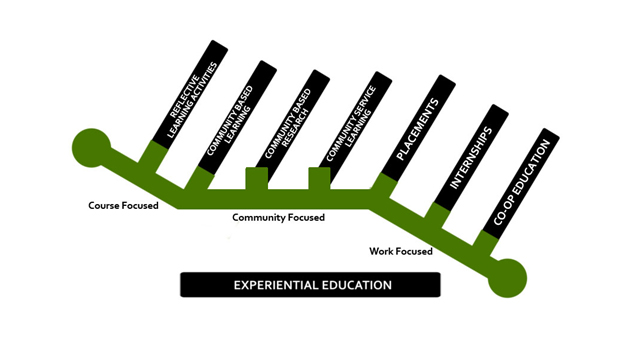Experiential Education (EE) is an approach to learning that bridges theory and practice by providing students with concrete applied practical experiences and then helping them to reflect on their experiences using the theoretical knowledge they have learned (York’s White Paper Companion, 2010:38).

EE at York is conceived as a broad continuum ranging from in-class reflective learning activities to internships and co-op education. A Pan-University EE Common Language document (2014) details seven EE strategies around three areas of focus: Course Focused, Community Focused, and Work Focused (see definitions and specific strategies under 3 Areas of Focus below).
Structured reflection is integral to all EE strategies. It is defined as any planned activity or exercise that requires students to refer back and critically examine the concrete experience in light of existing theory and/or what is being covered in the course. For example, following a concrete experience, students may have to: explain why certain events occurred, or justify the necessity of certain procedures, or consider the experience from multiple perspectives or challenge their assumptions or beliefs. The specific reflection activity or exercise will depend upon the intended learning outcome(s) for the students (for suggested reflective activities, go to our Reflection webpage).
3 Areas of Focus on the EE continuum
Course Focused
Course Focused EE exposes students to concrete learning activities in the course or classroom that require them to reflect on what they have experienced in relation to concepts/theories being covered in the course. All course focused EE strategies contribute to addressing student learning outcomes.
Reflective Learning Activities
This experiential education strategy allows students to apply theory and course content to concrete experiences that encourage reflection and conceptualization. These experiences not only encourage active learning but also include structured reflection, encouraging the student to refer back to the experience in an effort to make sense of it by considering relevant course material. These concrete experiences could take place within the classroom or outside the classroom through observation, reflection and practical applications.
Film
Guest Speakers
Case Studies
Simulation and Role Playing
Course-Based Research
With-in Community Learning Activities
Community Focused
Community Focused EE strategies give students the opportunity to connect course material with experiences that occur through interactions with partners in the community. Reflection remains a key element which requires students to link the concrete experience with the students’ understanding of theory. All community focused EE strategies contribute to addressing both student learning outcomes and identified community needs. Categories of community focused EE include the following:
Community Based Learning (CBL)
Work Focused
Work Focused EE strategies give students the opportunity to develop competencies and skills and augment the theories/concepts learned in their course/degree programs by getting hands-on work experience within organizational environments. Reflection remains a key element which requires students to link the concrete experience with the students’ understanding of theory. All work focused EE strategies contribute to addressing degree level expectations, in particular, the student’s ability to demonstrate autonomy and professional capacity. Categories of course focused EE include the following:
Placements
Students are given the opportunity to develop competencies and skills in organizational work environments that augment the theories/concepts learned in academic course settings. Students apply theories and concepts from their course work in a practice-based work environment and reflect upon their actions. Students engage in activities where they practice the discipline or course specific competencies; they receive course credit for doing so but (generally) are not paid. Placements are also known as fieldwork or field placements (e.g. Social Work, Communication & Culture, Anthropology, Disaster and Emergency Management) or practica (e.g. Nursing or Education).
Internships
Internships provide students with the opportunity to augment the theories/concepts learned throughout their degree and develop competencies and skills through hands-on work experience related to their field of study. Internships are paid, full-time, one-time, supervised work experiences in which learning is assessed via the student reflecting on their internship experience in the workplace and writing a work term report,* which is then reviewed and graded by the faculty supervisor. Internships are generally associated with academic programs that include a practice, service or professionally oriented applications.
*Best practices dictate that critical reflection about the concrete activity informs the report.
Co-operative Education Programs
Co-op programs provide students with the opportunity to integrate their classroom learning with hands-on work experience related to their field of study in which they alternate periods of paid, full-time, supervised work experiences with their academic terms. According to the Canadian Association for Cooperative Education (CAFCE; http://www.cafce.ca/en/coop-defined), a co-op program is one which alternates periods of academic study with periods of work experience in accordance with the following criteria:
- “each work situation is developed and/or approved by the co-operative educational institution as a suitable learning situation;
- the co-operative student is engaged in productive work rather than merely observing;
- the co-operative student receives remuneration for the work performed;
- the co-operative student's progress on the job is monitored by the co-operative educational institution;
- the co-operative student's performance on the job is supervised and evaluated by the student's co-operative employer; and
- time spent in periods of work experience must be at least thirty per cent of the time spent in academic study.”
Co-operative education programs can be either for credit or zero credit endeavours, and are generally noted on the transcript and degree. Co-operative student positions are most often 4 to 8 months in duration, with a commitment of 12-16 months in total over the course of the degree. Given the alternating nature, co-operative education programs tend, in most cases, to necessitate alignment with a trimester system.
For more detailed definitions of all EE types, view York's EE Common Language document.

